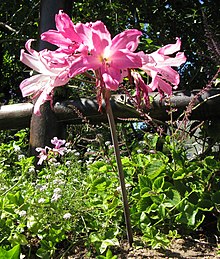scape
English
[edit]


Pronunciation
[edit]- IPA(key): /ˈskeɪp/
Audio (Southern England): (file) - Rhymes: -eɪp
Etymology 1
[edit]From Latin scāpus, from Doric Greek σκᾶπος (skâpos). Doublet of native English shaft.
Noun
[edit]scape (plural scapes)
- (botany) A leafless stalk growing directly out of a root, bulb, or subterranean structure.
- The basal segment of an insect's antenna (i.e. the part closest to the body).
- The basal part, more specifically known as the oviscape, of the ovipositor of an insect.
- (architecture) The shaft of a column.
- (architecture) The apophyge of a shaft.
Derived terms
[edit]Translations
[edit]Etymology 2
[edit]From Middle English scapen (whence also atscapen and ofscapen (“to escape”)), formed by aphesis from escapen, ascapen (“to escape”). Compare also Old French scapper, a variant of Old French eschaper, formed via similar process. Doublet of escape.
Verb
[edit]scape (third-person singular simple present scapes, present participle scaping, simple past and past participle scaped)
- (transitive, archaic) To escape (someone or something).
- c. 1600, John Donne, Elegy IX: The Autumnal, in Poems (1633)
- No spring nor summer beauty hath such grace / As I have seen in one autumnal face. / Young beauties force our love, and that's a rape, / This doth but counsel, yet you cannot scape.
- 1608, [Guillaume de Salluste] Du Bartas, “[Du Bartas His Second VVeeke, […]. David. […].] The Decay. The IIII. Book of the IIII. Day of the II. Week.”, in Josuah Sylvester, transl., Du Bartas His Deuine Weekes and Workes […], 3rd edition, London: […] Humfrey Lownes [and are to be sold by Arthur Iohnson […]], published 1611, →OCLC, page 619:
- He (to beguile the ſimple) makes no bone / To ſvvear by God (for he beleeues ther's none); / His Svvord's his Title; and vvho ſcapes the ſame, / Shall haue a Piſtol, or a Poyſonie dram: […]
- a. 1631 (date written), J[ohn] Donne, “(please specify the title)”, in Poems, […] with Elegies on the Authors Death, London: […] M[iles] F[lesher] for Iohn Marriot, […], published 1633, →OCLC:
- Hee will provide you keyes, and locks, to spie, / And scape spies, to good ends
- c. 1600, John Donne, Elegy IX: The Autumnal, in Poems (1633)
Noun
[edit]scape (plural scapes)
- (archaic) Escape.
- c. 1603–1604 (date written), William Shakespeare, “The Tragedie of Othello, the Moore of Venice”, in Mr. William Shakespeares Comedies, Histories, & Tragedies […] (First Folio), London: […] Isaac Iaggard, and Ed[ward] Blount, published 1623, →OCLC, [Act I, scene iii]:
- I spake of most disastrous chances, […] Of hairbreadth scapes in the imminent, deadly breach.
- (obsolete) A means of escape; evasion.
- (obsolete) A freak; a slip; a fault; an escapade.
- 1644, J[ohn] M[ilton], The Doctrine or Discipline of Divorce: […], 2nd edition, London: [s.n.], →OCLC, book:
- Not pardoning so much as the scapes of error and ignorance.
- (obsolete) A loose act of vice or lewdness.
- c. 1610–1611 (date written), William Shakespeare, “The Winters Tale”, in Mr. William Shakespeares Comedies, Histories, & Tragedies […] (First Folio), London: […] Isaac Iaggard, and Ed[ward] Blount, published 1623, →OCLC, [Act III, scene iii]:
- though I am not bookish, yyet I can read waiting-gentlewoman in the 'scape
Derived terms
[edit]Etymology 3
[edit]Probably imitative.
Noun
[edit]scape (plural scapes)
Part or all of this entry has been imported from the 1913 edition of Webster’s Dictionary, which is now free of copyright and hence in the public domain. The imported definitions may be significantly out of date, and any more recent senses may be completely missing.
(See the entry for “scape”, in Webster’s Revised Unabridged Dictionary, Springfield, Mass.: G. & C. Merriam, 1913, →OCLC.)
Anagrams
[edit]Latin
[edit]Noun
[edit]scāpe
Romanian
[edit]Pronunciation
[edit]Verb
[edit]scape
- English 1-syllable words
- English terms with IPA pronunciation
- English terms with audio pronunciation
- Rhymes:English/eɪp
- Rhymes:English/eɪp/1 syllable
- English terms borrowed from Latin
- English terms derived from Latin
- English terms derived from Doric Greek
- English lemmas
- English nouns
- English countable nouns
- en:Botany
- en:Architecture
- English terms inherited from Middle English
- English terms derived from Middle English
- English doublets
- English verbs
- English transitive verbs
- English terms with archaic senses
- English terms with quotations
- English terms with obsolete senses
- en:Scolopacids
- en:Plant anatomy
- Latin non-lemma forms
- Latin noun forms
- Romanian terms with IPA pronunciation
- Romanian non-lemma forms
- Romanian verb forms
